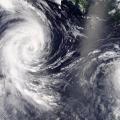Country territory - part earth surface, which is under its sovereignty, which includes land, subsoil, internal and territorial waters (12 miles from the coast) and the airspace above it (according to the altitude of aviation flights), and separated from other countries by borders recognized by international standards.
In addition to twelve miles of territorial waters (22.2 km) adjacent to the shores of Russia (and to the islands of the Russian Federation), there is a two-hundred-mile economic zone (370.4 km), within which the free passage of ships of all countries of the world is allowed, but the state (in this case,), to which the territorial waters belong, has the preemptive right to exploration and development of marine resources and seafood.
Among the negative ones stand out
It is naive to believe that information war is a clash of two opposing ideologies. Like physical warfare, which is a hybrid in this century, like neototalitarianism, which today takes on scattered and elusive forms, information warfare is also hybrid, more hidden and fragmented, as it has countless activities, all in turn can be used in different combinations.
Thus, it is a flexible web of ideologies that are not mandated by the respective governments, but rather grow out of the collective unconscious. This turns independent individuals into intermediaries. That is why censorship in such wars takes the form of self-censorship, voluntary self-hypnosis. It does not go from top to bottom, but from bottom to top, and uses tools such as virtual terror and digital fascism.
Territory, its size, configuration and natural features act as a factor of long-term action, but at different stages of history their role may change.
Big sizes Russian territory have both positive and negative features, i.e. are estimated ambiguously.
Among the positive ones stand out:
- availability of various natural resources and conditions as the basis for the territorial division of labor and broad specialization of the economy;
- availability of reserve land for settlement and production location;
- preservation of habitats of wild nature as an ecological reserve;
- the presence of "rear" spaces used during wars and other conflict situations.
Among the negative ones stand out:
Anyone who exposes ideologies and lies is mistaken in believing that the only thing behind them is the interests of the ruling oligarchs. These emblematic matrices do more than obscure reality. There should not have been a single naive oppositionist against the information war, but a cynical psychoanalyst who could raise conscious blocks of people without fear of expulsion from a sick society. As a psychoanalyst in the field of culture and a person who lifted the blockade of consciousness for himself through the Maidan ideology, I can say that the exit from the symbolic underlying matrix hurts.
- the need for the arrangement, protection and life support of huge spaces, incl. far removed from the developed regions;
- the need to build long lines of transport, communications and other infrastructure; huge costs of transporting goods and maintaining links between regions, center and periphery;
- the impossibility of uniform development and the creation of equivalent social conditions of life for people in central and remote regions, with different natural and economic conditions.
These negative features of the vastness and uneven development of the Russian space lead to an increase in the cost of economic activity and are a factor of long-term action. However, as the economic and transport development of the territory progresses, the effect of negative traits will weaken, and positive ones will intensify.
Therefore, the diagnostician's attempts to penetrate the information cocoons of the sufferers cause aggression. The conservative identity matrix is found among the majority of the citizens of Russia and the pro-Russian part of the population of Ukraine, which today is either physically destroyed by the government and military forces in its own country, or is simply marginalized. Such Ukrainians tremble with fear and hide their Saint George and Russian Orthodox crucifixes.
These people can be divided into two subgroups: those who yearn for the left, a Soviet identity, and those who support the right-wing idea of a monarchical little Russian country. This identical matrix can be characterized as conservative, because the internationalist image of friendship between peoples, rooted in the minds of the Soviet people, is seen as something raised.
The very fact of owning a large territory is important factor geopolitical stability of the country.
There is such an important concept - the state. The state is people living in a certain territory, and at the same time it is a political space. Our state is called Russia. Russia occupies a huge territory, one-eighth of the earth's land mass inhabited by man.
Useful information for tourists
The second case concerns the annexation of eastern Ukraine to the "imperial" space of the "united" Russia - both directly and figuratively. Often, Russian volunteers in Donbass declare their correct idea, and those who call themselves “nationalists”: the comparison of the red sign and the banner of Alexander Nevsky in the battalion, despite the external contradiction, is considered a “symbolic field” of the Russian world.
By the way, the presence of such "legitimized" paradoxes is a typical symptom of any ideology. Let us now turn to the liberals. Their ideology has no less, if not more, such legitimate contradictions both in Russia and in Ukraine. The most important of these is that liberals are against any beating of people, unless they are liberals.
Russia is great from birth, not because of conquests. Its history is multifaceted. On the territory of our country, long before statehood, lived different nations... Each nation occupied its own geographical and historical niche, bore the stamp of originality and uniqueness. The Russian state inherited many traditions that had developed before it on this territory, including good-neighborly relations.
Supreme Legislature
The ambiguity that masks the hypocrisy of liberalism is that it uses its right-wing extremists to actively support the free market. In Ukraine, the camp of liberals consists of supporters of the ideas of the early - "student" - protest of the Maidan. Some of them, the so-called national liberals, joined the radicals who accepted the protest. Other so-called left-wing liberals, on the other hand, are in conflict with the radicals. Unlike Russian liberals, Ukrainian liberals are less homogeneous.
The geographical position of Russia is unique, its territory covers several natural areas: arctic desert, tundra, steppe, semi-desert, forest-tundra and others.
Like any other state, Russia has its own flag, anthem and coat of arms. Russia is a federal state. Our state is headed by the President. State protection is carried out by the Armed Forces. Day and night in the air, on land, on the water, they vigilantly follow all the events taking place. The task of the Armed Forces is not to let the enemy pass. It is very important that all Russian citizens sleep in a calm, peaceful sleep.
A brief excursion into history
They are afraid to turn to the fault of the Ukrainian government for the war, considering "Russian aggression" as their consequence. Some left-wing liberals also include some religious liberals, and they are somewhat more determined in their opinion: they advocate multiculturalism and a multipolar society. They call themselves "neoliberals", that is, "modernized" liberals. They are joined by religious liberals - parishioners of Protestant denominations, Greek Catholics, who in the network of our matrix represent a special political culture.
Russia is especially proud of the fact that more than 190 peoples live on its territory. All peoples of Russia (Mordovians, Udmurts, Ossetians, Buryats and others) live their full lives.
According to the Constitution (basic law) official language on the territory of the country - Russian. All laws, regulations are written on it, the Constitution is also written on it. Russian Federation
This modernization, apparently, in an attempt to partially capture the "left" anti-globalization and anti-American ideas and expose the unanimous criticism from the Ukrainian nationalists: "The left is shit" is already a legitimate slogan on internal banners. But even left-wing liberals cannot now conduct a dialogue with Donbass and with Russia without abandoning the idea of "Russian aggression". They are limited the cultural world and "tolerant half-truths" within the framework of a humanistic debate for all good and all evil.
Now we come to the most catastrophic unit matrix, radicals, for Ukraine. Their strength doubles because the government supports them unofficially, but also openly. These are "dogs of war". The identity matrix of an extremist has almost no self-censorship because it is beyond doubt. Such people cannot be changed in any way. Nevertheless, they need to be given specific strict logic if they cynically demand the creation of a mono-ethnic state, the purification of all those who think otherwise, and the restoration of Donbass, inhabited by Vatniki.
As for the Russian economy, it should be said that the level economic development countries are a historical concept. Different periods of development Russian economy and the world economy have made and are making certain adjustments to the composition of the main economic indicators.
The economy has tough times. But the whole history of the Russian people shows that their creative powers, intellectual and labor potential will overcome difficulties in any case.
This does not rule out the willingness of some extremists to work for any oligarch who pays them money. The radicals, first promoted by the government and then disenchanted, are gradually spiraling out of control and demanding right-wing dictatorships. Similar radical groups exist today in Russia, which tried to create a kind of counterbalance to Bandera Ukraine. Russian radicals are a caricature of Ukrainians.
Thus, the so-called quiet effect occurs when two opposites work for each other and for the oligarchy. Russian radicals, unlike Russian conservatives, represent a clearly isolationist position: they want to finally delimit Russia from Ukraine, which they portray as the leopardy of neo-Nazism, and minimize Russia's losses in Ukraine by adding volunteers to Donbass and limit the flow of Ukrainian peacekeepers to Russia, which can change mass consciousness.
Today Russia is the largest state with a population of 150 million. Russia has always pursued a friendly policy, a policy of partnership with other countries: large and small, near and far.
Russia is our Motherland. Our blood relatives lived and worked on this land. Many of them defended their homeland with arms in hand. Not everyone returned from the battlefield, eternal memory to them, who fell in unequal battles for the Fatherland. Homeland is a great word, great and very important.
Among the positive ones stand out
Radical ideology must have two key myths: "friends" and "enemies." Both are important for welding and play a strict role. Nothing threatens the nationalist order like the symbolic "death" of the enemy. If you learn to ridicule and delight in your opponent's foolishness, you can create an undetectable ingredient - a traumatic excess or a cleft that won't heal the wound. This component must be canceled at all costs as it damages the identity matrix.
Rivers and lakes in Russia
It is symptomatic that some anti-fascist forces of the left and “Soviet” popular militia groups in Donbass have come into conflict with radical isolationists in Russia. They are interested in supporting the pro-Russian part of Ukraine, while the isolationists subconsciously try to instill in them that they are illegal and that they do not exist there, because the war in Ukraine is more civil. The isolationists are also in conflict with the conservative center in the Presidential Administration of the Russian Federation, which is interested in the Minsk Agreement and the restoration of dialogue between Kiev and Moscow.




